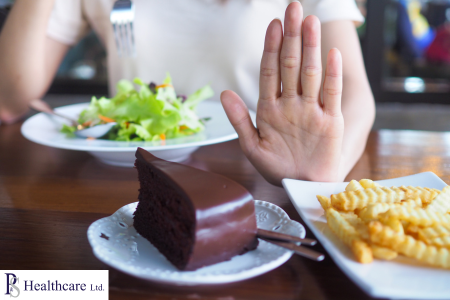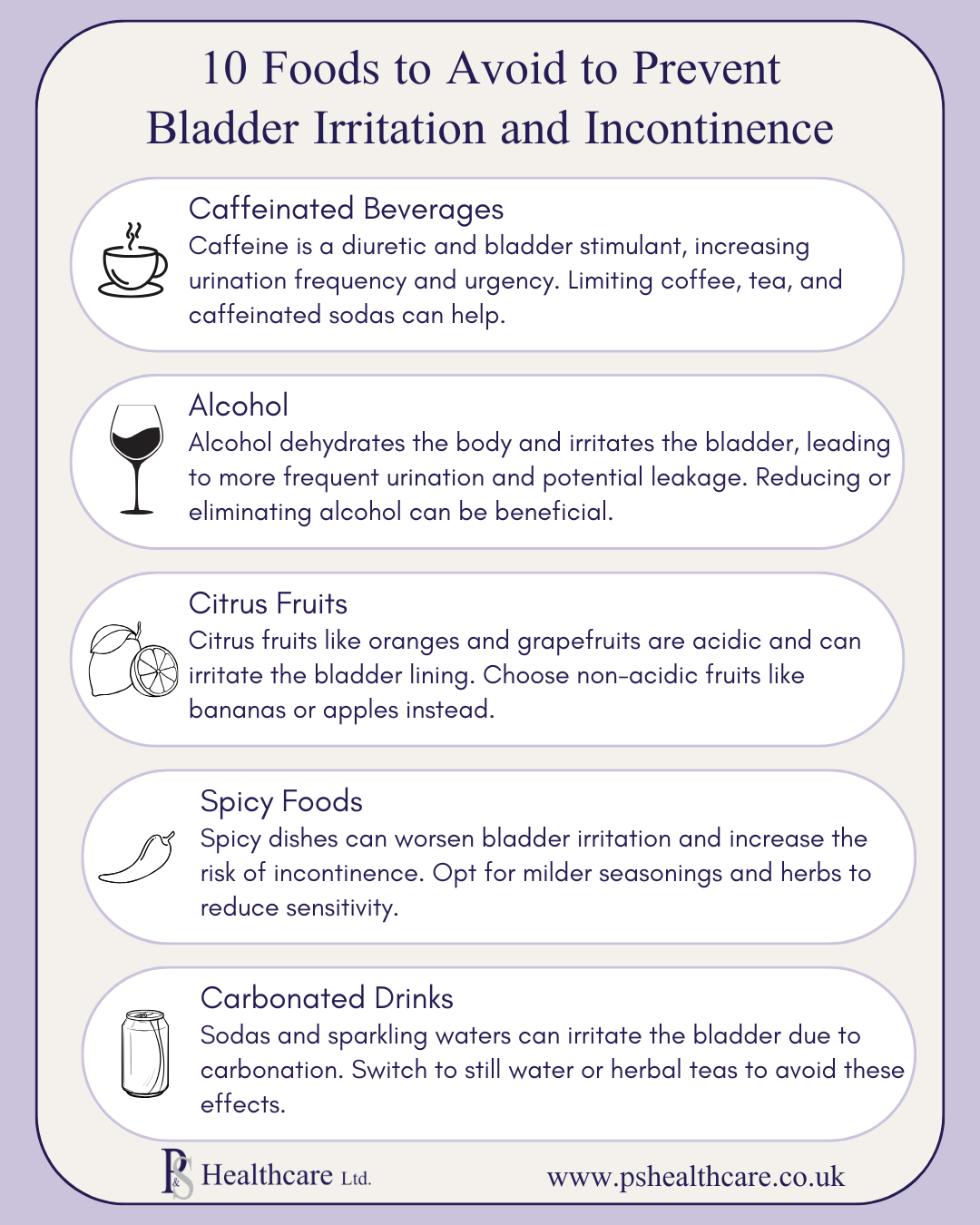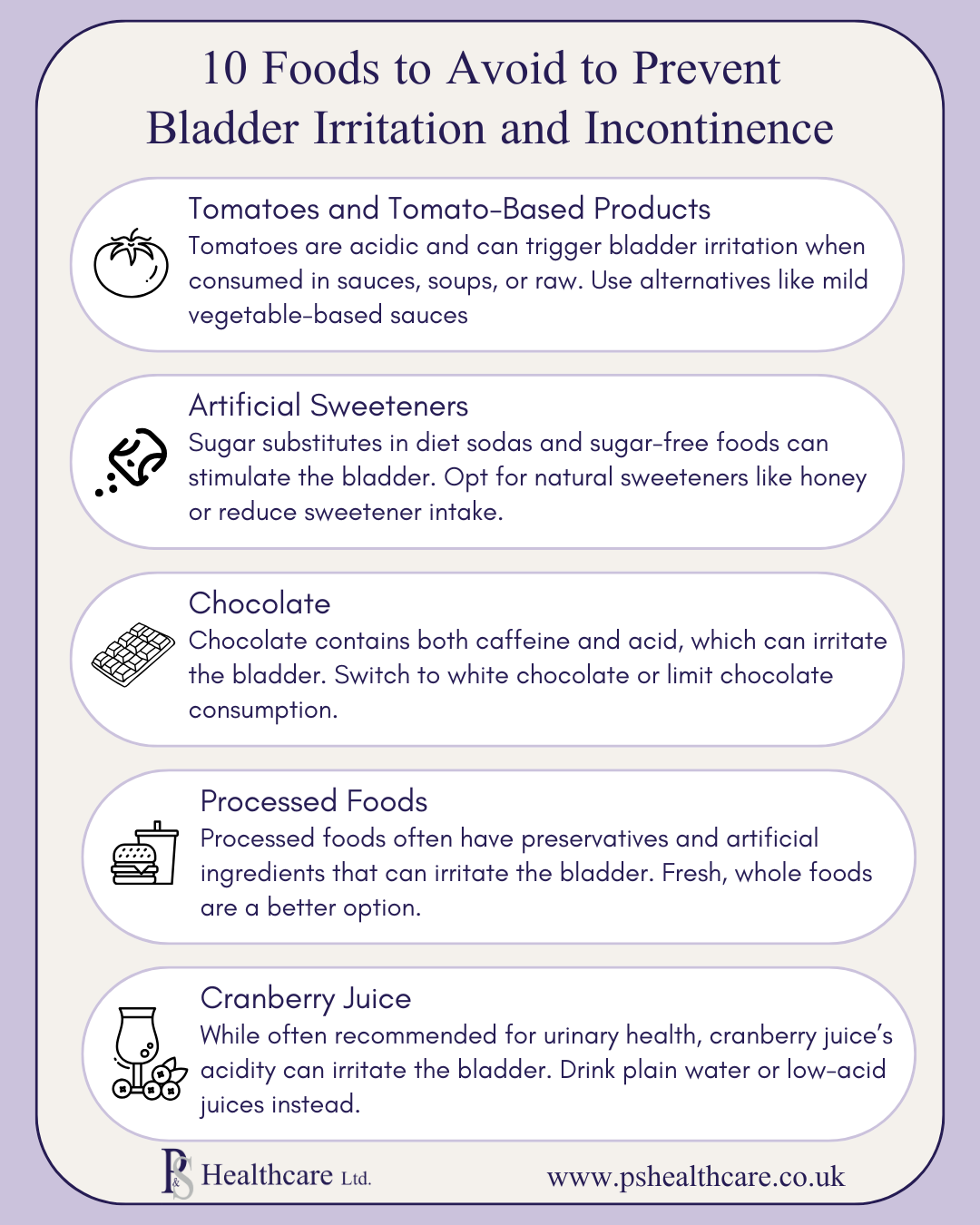10 Foods to Avoid to Prevent Bladder Irritation and Incontinence

Bladder health is crucial for maintaining comfort and confidence in daily life. For those managing incontinence, dietary choices can play a significant role in bladder irritation and overall bladder control. Here are ten foods and drinks that can contribute to bladder irritation and how you can manage your diet to reduce incontinence symptoms.
1. Caffeinated Beverages
Caffeine acts as a diuretic and bladder stimulant, increasing the frequency and urgency of urination. Limiting coffee, tea, and other caffeinated drinks can help reduce bladder irritation.
2. Alcohol
Alcohol can dehydrate the body and irritate the bladder, leading to increased urination and potential leakage. Reducing or eliminating alcohol from your diet can help manage symptoms of incontinence.
3. Citrus Fruits
While healthy, citrus fruits like oranges, grapefruits, and lemons are highly acidic and can irritate the bladder lining. Opt for non-acidic fruits like bananas or apples to avoid discomfort.
4. Spicy Foods
Spicy dishes can exacerbate bladder irritation and lead to an increased risk of incontinence episodes. Mild seasonings and herbs can be used as an alternative to reduce bladder sensitivity.
5. Carbonated Drinks
Sodas and sparkling waters can irritate the bladder due to carbonation. Sticking to still water or herbal teas can help mitigate these effects.
6. Tomatoes and Tomato-Based Products
Tomatoes are naturally acidic and can cause bladder irritation when consumed in sauces, soups, or raw. Reducing tomato intake or using alternatives like mild vegetable-based sauces can benefit bladder health.
7. Artificial Sweeteners
Sugar substitutes found in diet sodas, sugar-free sweets, and other low-calorie foods can stimulate the bladder and contribute to incontinence. Opting for natural sweeteners like honey or reducing overall sweetener use is a wise choice.
8. Chocolate
Chocolate contains both caffeine and acid, which can irritate the bladder. Switching to white chocolate or minimising chocolate consumption can make a noticeable difference.
9. Processed Foods
Many processed foods contain high levels of preservatives and artificial ingredients that can irritate the bladder. Choosing fresh, whole foods helps minimise exposure to these irritants.
10. Cranberry Juice
Though cranberry juice is often recommended for urinary health, its acidity can be problematic for those prone to bladder irritation and incontinence. Drink plain water or low-acid juices instead.
Tips for Better Bladder Health
Stay Hydrated: Drinking enough water helps dilute urine, reducing irritation.
Monitor Your Diet: Keep a food diary to identify which foods trigger symptoms.
Consult with a Professional: A healthcare provider can guide you on dietary choices and other strategies to manage incontinence effectively.
By avoiding these common bladder irritants, you can take steps toward better bladder health and improved quality of life.
And don't forget to download our handy infographic below...


More News:
- Choosing the Right Children's Nighttime Pants and Daytime Solutions
- How to Choose the Right Incontinence Supplies for Men Over 50
- Christmas Confidence
- Real Women, Real Stories: Living Confidently with Washable Incontinence Pants
- A Real-Life Guide to Incontinence Bed Sheets & Washable Bed Pads
- The Environmental Benefits of Reusable Bedwetting Pants for Kids
- Men's Washable Incontinence Pants for Everyday Confidence: A User's Guide
- Top Features to Look for in Washable Incontinence Pants for Women
- 5 Mistakes to Avoid When Washing Your Reusable Incontinence Bed Pads
- The Best Bedwetting Pants for Children: What Parents Need to Know
- Male Washable Incontinence Pants vs. Disposable: Which Is Better?
- The Best Incontinence Pants for Women
- The Complete Guide to Washable Bed Pads & Incontinence Products
- How to Talk to Your Child About Incontinence: Supportive Parenting Strategies
- Incontinence Supplies for Men: What You Actually Need
- Washable Incontinence Pants for Women: A Comfortable, Eco-Friendly Solution
- Children's Incontinence Pants: How They Help Kids Stay Dry and Confident
- Why More Men Are Switching to Washable Incontinence Pads and Pants
- Managing Incontinence as a Woman: Tips for Travel, Work, and Home Life
- The Best Washable Incontinence Pants in the UK
- Real Stories from Families Using Children's Nighttime Pants
- Caring for a Loved One? A Carer's Guide to Incontinence Supplies for Men
- Why Ladies Washable Incontinence Pants Are Better for the Planet
- Understanding Why Older Children Still Wet the Bed and What You Can Do About It
- Travelling with Incontinence: Best Washable Incontinence Pants for Men on the Go
- Your Guide to Washable Incontinence Pants for Ladies: FAQs Answered
- The Benefits of Switching to Washable Incontinence Products
- 8 Everyday Activities That Can Strengthen or Weaken Your Bladder
- 10 Things You Should Pack in an Incontinence Emergency Kit
- 10 Foods to Eat and Avoid for Better Bowel Control
- 8 Ways Stress and Anxiety Can Affect Bladder Health
- 10 Signs It's Time to See a Doctor About Your Urinary Incontinence
- 10 Tips for Talking to Your Child About Bedwetting
- 10 Things You Should Know About Postpartum Incontinence
- 10 Common Triggers of Urinary Incontinence in Women Over 50
- 10 Tips for Night-Time Incontinence Management in Adults
- 10 Ways to Manage Incontinence While Playing Sports
- Your Incontinence Options: Finding the Right Solution for You
- 10 Tips for Managing Faecal Incontinence in Adults
- 10 Lifestyle Changes to Manage Urinary Incontinence Symptoms
- 10 Ways to Manage Urinary Incontinence During Pregnancy
- 10 Causes of Urinary Incontinence in Men and How to Treat Them
- 10 Practical Solutions for Coping with Incontinence at Work
- 10 Myths About Menopause and Incontinence You Should Stop Believing
- 10 Foods to Avoid to Prevent Bladder Irritation and Incontinence
- 10 Effective Pelvic Floor Exercises for Urinary Incontinence
- 10 Common Causes of Bedwetting in Children and How to Address Them
- Causes of Faecal Incontinence
- Breaking the Silence: Managing Incontinence with Confidence
- Supporting Loved Ones with Incontinence: A Caregiver's Guide
- Top 10 Tips for Managing Incontinence Comfortably This Christmas
- Pregnancy and Postpartum Incontinence: Prevention and Recovery
- 10 Random Facts About Pee You Probably Didn't Know
- Diet and Bladder Health: Foods That Help and Hurt
- Helping Your Child Manage Incontinence: A Parent's Resource
- The Most Common Bladder Control Problems and How to Manage Them
- 10 Things That Can Make Incontinence Worse
- Incontinence Myths vs Facts - Dispelling Common Misconceptions
- Top 10 tips to help with bladder control during pregnancy
- 10 Effective Ways to Stop Bladder Leaks & Manage Incontinence
- P&S Washable Face Mask with ViralOff
- New Product For Men - The Slip Brief
- New Monthly Protection Briefs For Women
- New Product - The OooPS Pant for Stress Incontinence
- New Adult Inco-elite Range Launched
- EMDA WOMEN OF WORTH AWARD 2009
- New Website Launched
- New Website Under Development

